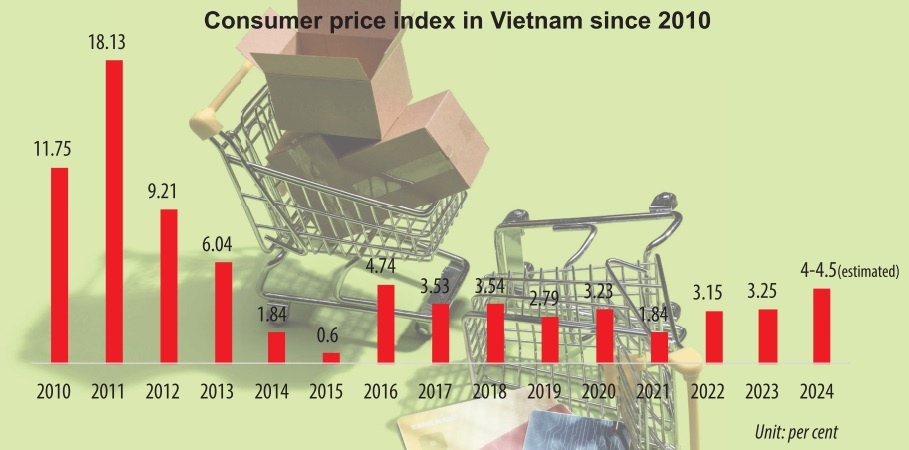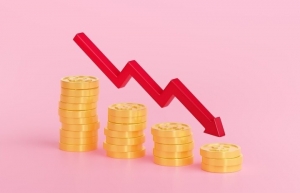Inflation control under pressure from all directions
 |
| Inflation control under pressure from all directions, photo Le Toan |
The government’s key annual resolution on tasks to implement the country’s socioeconomic development plan and state budget estimates for the year has underlined the need for authorised agencies to closely follow the world’s economic situation in order to take proper action domestically to rein in inflation at 4-4.5 per cent, as set by the National Assembly (NA).
According to the General Statistics Office (GSO), a number of factors are expected to pressurise the government’s efforts in controlling inflation this year, such as a hike in salary both for the public and private sectors, and an increase in consumption in the domestic market and electricity prices.
 |
The government is now considering a rise in regional minimum salary for enterprises in different regions by 6 per cent this year, valid from July 1. This increase level was fixed by the National Salary Council last month, and will be subject to the government’s approval.
If adopted, the wage in Region 1 will be adjusted from around $197.50 to $209 per month. The 6 per cent increase is tantamount to a climb of $10.55 in Region 2, and $9.30 and $8.45 in Regions 3 and 4, respectively.
Region 1 embraces the urban areas of Hanoi and Ho Chi Minh City; Region 2 encompasses the rural areas of these two cities, along with major urban areas in the country such as Can Tho, Danang, and Haiphong; Region 3 covers provincial cities and the districts of Bac Ninh, Bac Giang and Hai Duong provinces; and Region 4 includes the rest of the country.
According to a NA resolution adopted last November, the government will have to implement a new salary regime for the public sector from July. The new salary regime is part of a bigger plan for comprehensive salary reform being drafted by the government in accordance with a 2018 resolution on reforming the country’s wage policies. The new salary regime should have been implemented in 2021 but has been delayed.
Since July 2023, the base salary for cadres, public servants, and armed forces’ personnel has increased by 20.8 per cent to $76 a month.
Under its plan, the NA has agreed to transfer $803.3 million from localities failed to be disbursed for salary reform in the public sector in 2023 to this year for the same purpose.
According to the GSO, psychologically, rises in salaries will often cause a hike in prices in the market, as an increase in fuel and electricity prices often do.
At a meeting on reviewing Vietnam Electricity (EVN) operations in 2023 and tasks for 2024 in Hanoi on January 2, Nguyen Hoang Anh, chairman of the Commission for Management of State Capital at Enterprises, said that EVN suffered from a loss [of about $1.03 billion] in 2023, due to a rise in input material prices and high exchange rates.
“If electricity prices fails to increase, the loss will continue in 2024. The government is considering a mechanism that may allow an electricity price hike of below 5 per cent every three months,” Anh said.
According to the GSO, a hike in power prices has contributed to the consumer price index (CPI) in 2023. Specifically, the price of household electricity rose 4.86 per cent, leading to a 0.16 per cent rise in CPI. If the electricity price is increased in 2024, the CPI will continue to climb.
The GSO also said the government’s efforts to control inflation this year will be affected by an expansion in travelling, ascending consumption of goods and services.
The total retail and service consumption revenue in 2023 in the country is estimated to have reached more than $262.94 billion, up 9.6 per cent on-year.
The goods retail revenue last year hit $205 billion, accounting for 78 per cent of total and up 8.6 per cent on-year - in which the price of many important groups of items also expanded, such as cultural and educational items (14.4 per cent); food and foodstuff (11.7 per cent); home appliances (7.5 per cent); and textiles and garments (7.1 per cent).
Vietnam’s CPI in 2023 rose 3.25 per cent compared to the previous year.
According to the Asian Development Bank, Vietnam’s prudent and proactive monetary policy, supported by price controls on gasoline, electricity, food, health care, and education, should keep inflation in check. The inflation forecasts are maintained at 4 per cent for 2024.
 | Inflation putting pressure on myriad of sectors A rise in prices of medical and education services, as well as expansion in domestic consumption, contributed largely to the consumer price index in November. |
 | US Fed 'within striking distance' of inflation target: official The US Federal Reserve is "within striking distance" of reaching its long-term inflation target and could begin cutting interest rates this year, a senior official said Tuesday. |
What the stars mean:
★ Poor ★ ★ Promising ★★★ Good ★★★★ Very good ★★★★★ Exceptional
Related Contents
Latest News
More News
- Tet event in Japan celebrates success of 14th National Party Congress (January 25, 2026 | 10:04)
- 14th National Party Congress wraps up with success (January 25, 2026 | 09:49)
- Congratulations from VFF Central Committee's int’l partners to 14th National Party Congress (January 25, 2026 | 09:46)
- List of newly-elected members of 14th Political Bureau announced (January 23, 2026 | 16:27)
- 14th Party Central Committee unanimously elects To Lam as General Secretary (January 23, 2026 | 16:22)
- List of members of 14th Party Central Committee announced (January 23, 2026 | 09:12)
- Highlights of fourth working day of 14th National Party Congress (January 23, 2026 | 09:06)
- Press provides timely, accurate coverage of 14th National Party Congress (January 22, 2026 | 09:49)
- Press release on second working day of 14th National Party Congress (January 22, 2026 | 09:19)
- Minister sets out key directions to promote intrinsic strength of Vietnamese culture (January 22, 2026 | 09:16)

 Tag:
Tag:

















 Mobile Version
Mobile Version